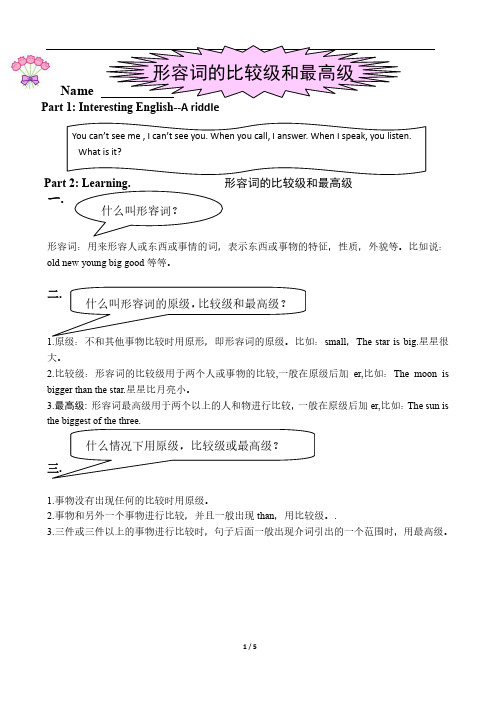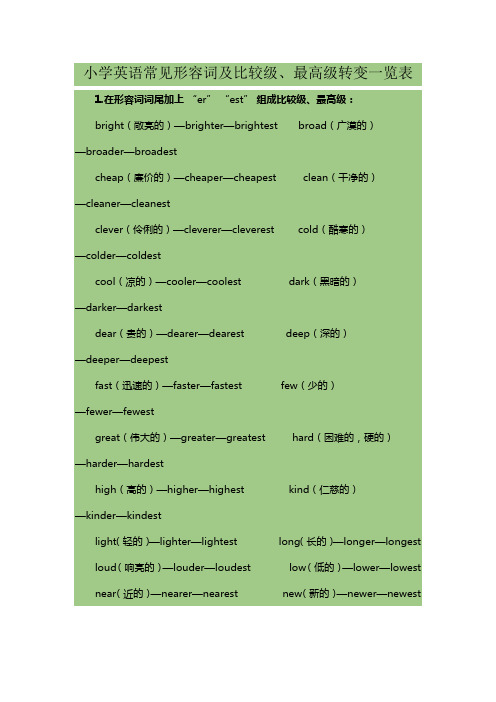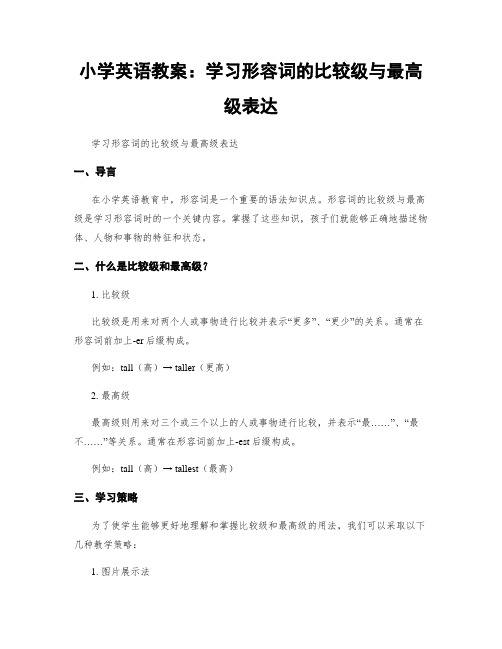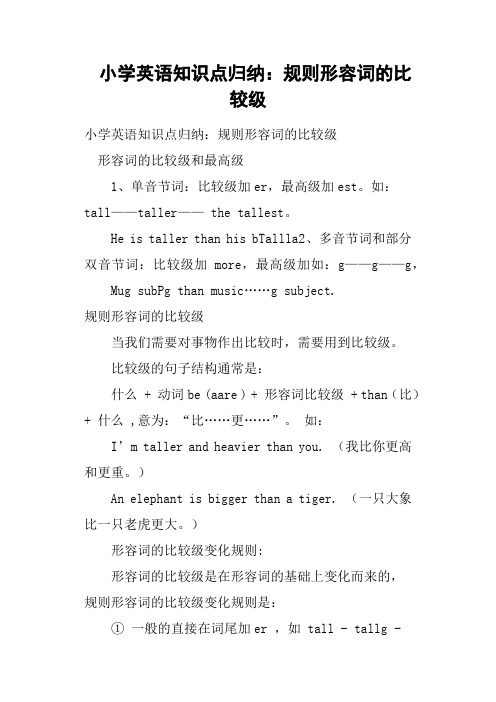小学英语形容词的比较级
小学英语语法 形容词的比较级和最高级及练习

一.形容词:用来形容人或东西或事情的词,表示东西或事物的特征,性质,外貌等。
比如说:old new young big good 等等。
small ,The star is big.星星很大。
2.比较级:形容词的比较级用于两个人或事物的比较,一般在原级后加er,比如:The moon is bigger than the star.星星比月亮小。
3.最高级: 形容词最高级用于两个以上的人和物进行比较,一般在原级后加er,比如:The sun is the biggest of the three.1.事物没有出现任何的比较时用原级。
2.事物和另外一个事物进行比较,并且一般出现than ,用比较级。
.3.三件或三件以上的事物进行比较时,句子后面一般出现介词引出的一个范围时,用最高级。
(1)一般情况下,单音节或双音节的形容词比较级+er ,最高级+est,如:clever-cleverer-the cleverest fast-faster-the fastestsmall-smaller-the smallest等(2)以e结尾的词,比较级+r,最高级+st即可,如:nice-nicer-the nicest cute-cuter-the cutest large-larger-the largest (3)以辅音字母+y结尾的变y为i+er或est,如:easy-easier-the easiesthappy-happier-the happiest再如:early , busy , heavy , dirty , lazy ,也如此(4)双写最后一个辅音字母+er或est的词要用心去记1. fat-fatter-the fattest2. thin-thinner-the thinnest3. hot-hotter-the hottest4. red-redder-the reddest5. wet-wetter-the wettest6. big-bigger-the biggest(5)多音节和部分双音节的词需要在形容词原级前+more构成比较级,+the most构成最高级。
小学英语形容词的比较级和最高级

小学英语常见形容词及比较级、最高级转变一览表1.在形容词词尾加上“er” “est”组成比较级、最高级:bright(敞亮的)—brighter—brightest broad(广漠的)—broader—broadestcheap(廉价的)—cheaper—cheapest clean(干净的)—cleaner—cleanestclever(伶俐的)—cleverer—cleverest cold(酷寒的)—colder—coldestcool(凉的)—cooler—coolest dark(黑暗的)—darker—darkestdear(贵的)—dearer—dearest deep(深的)—deeper—deepestfast(迅速的)—faster—fastest few(少的)—fewer—fewestgreat(伟大的)—greater—greatest hard(困难的,硬的)—harder—hardesthigh(高的)—higher—highest kind(仁慈的)—kinder—kindestlight(轻的)—lighter—lightest long(长的)—longer—longest loud(响亮的)—louder—loudest low(低的)—lower—lowest near(近的)—nearer—nearest new(新的)—newer—newestpoor(穷的)—poorer—poorest quick(快的)—quicker—quickestquiet(安静的)—quieter—quietest rich(富裕的)—richer—richestshort(短的)—shorter—shortest slow(慢的)—slower—slowestsmall(小的)—smaller—smallest smart(伶俐的)—smarter—smartestsoft(柔软的)—softer—softest strong(强壮的)—stronger—strongestsweet(甜的)—sweeter—sweetest tall(高的)-taller-tallestthick(厚的)—thicker—thickest warm(温暖的)—warmer—warmestweak(弱的)—weaker—weakest young(年轻的)—younger—youngest2.双写最后一个字母,再加上“er” “est”组成比较级、最高级:big(大的)—bigger—biggest fat(胖的)—fatter—fattest hot(热的)—hotter—hottest red(红的)—redder—reddest sad(悲伤的)—sadder—saddest thin(瘦的)—thinner—thinnestwet(湿的)—wetter—wettest mad(疯的)—madder—maddest3.以不发音的字母e结尾的形容词,加上“r” “st”组成比较级、最高级:able(能干的)—abler—ablest brave(勇敢的)—braver—bravestclose(接近的)—closer—closest fine(好的,完美的)—finer—finestlarge(庞大的)—larger—largest late(迟的)—later—latestnice(好的)—nicer—nicest ripe(成熟的)—riper—ripest rude(粗鲁的)—ruder—rudest safe(安全的)—safer—safeststrange(奇怪的)—stranger—strangest wide(宽广的)—wider—widestwise(睿智的,伶俐的)—wiser—wisest white(白的)—whiter—whitest4.以字母y结尾的形容词,把y改成i,再加上“er” “est”组成比较级、最高级:busy(忙碌的)—busier—busiest dirty(脏的)—dirtier—dirtiestdry(干燥的)—drier—driest early(早的)—earlier—earliest easy(容易的)—easier—easiest friendly(友好的)—friendlier—friendliestfunny(好玩的)—funnier—funniest happy(高兴的)—happier—happiesthealthy(健康的)—healthier—healthiest heavy(重的)—heavier—heaviesthungry(饿的)—hungrier—hungriest lazy(懒惰的)—lazier—laziestlucky(幸运的)—luckier—luckiest naughty(顽皮的)—naughtier—naughtiestnoisy(喧闹的)—noisier—noisiest pretty(美丽的)—prettier—prettiestsilly(傻的)—sillier—silliest spicy(辣的)—spicier—spiciest thirsty(渴的)—thirstier—thirstiest ugly(丑的)—uglier—ugliest5.双音节、多音节形容词,在单词前面加上“more” “most”组成比较级、最高级:afraid(害怕的)—more afraid—most afraidbeautiful(美丽的)—more beautiful—most beautifulcareful(仔细的)—more careful—most carefulcheerful(高兴的)—more cheerful—most cheerfulcrowded(拥堵的)—more crowded—most crowdeddangerous(危险的)—more dangerous—most dangerousdelicious(美味的)—more delicious—most deliciousdifficult(困难的)—more difficult—most difficultexciting(令人兴奋的)—more exciting—most excitingexpensive(昂贵的)—more expensive—most expensivefamous(著名的)—more famous—most famousfrightened(受惊的)—more frightened—most frightenedfrightening(令人害怕的)—more frightening—most frighteninghard-working(勤奋的)—more hard-working—most hard-working helpful(有帮忙的)—more helpful—most helpfulhonest(诚实的)—more honest—most honestimportant(重要的)—more important—most importantinteresting (有趣的)—more interesting—most interestingpolite(有礼貌的)—more polite—most politeterrible(恐怖的)—more terrible—most terribletired(累的)—more tired—most tired6.不规则转变的形容词:bad(坏的)—worse—worst far(远的)—farther—farthest (far—further—furthest)good(好的)—better—best ill(病的)—worse—worstlittle(少的)—less—least many(多的)—more—most much(多的)—more—mostold(年老的)—older—oldest ( old—elder—eldest) well(好的,身体好的)—better—best。
小学英语教案:学习形容词的比较级与最高级表达

小学英语教案:学习形容词的比较级与最高级表达学习形容词的比较级与最高级表达一、导言在小学英语教育中,形容词是一个重要的语法知识点。
形容词的比较级与最高级是学习形容词时的一个关键内容。
掌握了这些知识,孩子们就能够正确地描述物体、人物和事物的特征和状态。
二、什么是比较级和最高级?1. 比较级比较级是用来对两个人或事物进行比较并表示“更多”、“更少”的关系。
通常在形容词前加上-er后缀构成。
例如:tall(高)→ taller(更高)2. 最高级最高级则用来对三个或三个以上的人或事物进行比较,并表示“最……”、“最不……”等关系。
通常在形容词前加上-est后缀构成。
例如:tall(高)→ tallest(最高)三、学习策略为了使学生能够更好地理解和掌握比较级和最高级的用法,我们可以采取以下几种教学策略:1. 图片展示法通过使用具有明显差异特征的图片,引导学生进行对比,并结合相关的形容词进行描述,从而培养他们的比较意识。
例如展示一张矮树和高树的图片,让学生用形容词tall(高)来描述两棵树,并找出不同之处。
2. 游戏化教学将学习过程设计成游戏形式,增加趣味性和互动性。
可以利用像“找朋友”、“拔河比赛”等游戏,引导学生运用比较级进行对比,并通过比赛来培养他们在英语表达中使用比较级的能力。
3. 句型模仿给学生提供一些常见的句子模板,鼓励他们根据不同情境进行创造性运用。
例如:This book is ________ than that one.(这本书比那本书_______)四、教案示例以下是一份小学英语教案示例,旨在帮助老师更好地指导学生学习形容词的比较级与最高级表达:主题:Describing People's Height(描述人的身高)年级:五年级时间:1个课时活动1:Warm-up(热身活动)介绍身高这个话题,并以简单的方式问学生几个关于身高的问题。
例如:“Who is the tallest student in your class?”(你们班最高的学生是谁?)活动2:Vocabulary Practice(词汇练习)呈现一些常见的形容词,如tall、short、thin和fat,并让学生理解这些形容词的含义。
小学英语常见形容词及比较级

小学英语常见形容词及比较级、最高级变化一览表1.在形容词词尾加上“er”“est”构成比较级、最高级:bright(明亮的)—brighter—brightestbroad(广阔的)—broader—broadestcheap(便宜的)—cheaper—cheapestclean(干净的)—cleaner—cleanestclever(聪明的)—cleverer—cleverestcold(寒冷的)—colder—coldestcool(凉的)—cooler—coolestdark(黑暗的)—darker—darkestdear(贵的)—dearer—dearestdeep(深的)—deeper—deepestfast(迅速的)—faster—fastestfew(少的)—fewer—fewestgreat(伟大的)—greater—greatesthard(困难的,硬的)—harder—hardesthigh(高的)—higher—highestkind(善良的)—kinder—kindestlight(轻的)—lighter—lightestlong(长的)—longer—longestloud(响亮的)—louder—loudestlow(低的)—lower—lowestnear(近的)—nearer—nearestnew(新的)—newer—newestpoor(穷的)—poorer—poorestquick(快的)—quicker—quickestquiet(安静的)—quieter—quietestrich(富裕的)—richer—richestshort(短的)—shorter—shortestslow(慢的)—slower—slowestsmall(小的)—smaller—smallestsmart(聪明的)—smarter—smartestsoft(柔软的)—softer—softeststrong(强壮的)—stronger—strongestsweet(甜的)—sweeter—sweetesttall(高的)-taller-tallestthick(厚的)—thicker—thickestwarm(温暖的)—warmer—warmestweak(弱的)—weaker—weakestyoung(年轻的)—younger—youngest2.双写最后一个字母,再加上“er”“est”构成比较级、最高级:big(大的)—bigger—biggestfat(胖的)—fatter—fattesthot(热的)—hotter—hottestred(红的)—redder—reddestsad(伤心的)—sadder—saddestthin(瘦的)—thinner—thinnestwet(湿的)—wetter—wettestmad(疯的)—madder—maddest3.以不发音的字母e结尾的形容词,加上“r”“st”构成比较级、最高级:able(能干的)—abler—ablestbrave(勇敢的)—braver—bravestclose(接近的)—closer—closestfine(好的,完美的)—finer—finestlarge(巨大的)—larger—largestlate(迟的)—later—latestnice(好的)—nicer—nicestripe(成熟的)—riper—ripestrude(粗鲁的)—ruder—rudestsafe(安全的)—safer—safeststrange(奇怪的)—stranger—strangestwide(宽广的)—wider—widestwise(睿智的,聪明的)—wiser—wisestwhite(白的)—whiter—whitest4.以字母y结尾的形容词,把y改为i,再加上“er”“est”构成比较级、最高级:busy(忙碌的)—busier—busiestdirty(脏的)—dirtier—dirtiestdry(干燥的)—drier—driestearly(早的)—earlier—earliesteasy(容易的)—easier—easiestfriendly(友好的)—friendlier—friendliestfunny(好玩的)—funnier—funniesthappy(开心的)—happier—happiesthealthy(健康的)—healthier—healthiestheavy(重的)—heavier—heaviesthungry(饿的)—hungrier—hungriestlazy(懒惰的)—lazier—laziestlucky(幸运的)—luckier—luckiestnaughty(调皮的)—naughtier—naughtiestnoisy(嘈杂的)—noisier—noisiestpretty(美丽的)—prettier—prettiestsilly(傻的)—sillier—silliestspicy(辣的)—spicier—spiciestthirsty(渴的)—thirstier—thirstiestugly(丑的)—uglier—ugliest5.双音节、多音节形容词,在单词前面加上“more”“most”构成比较级、最高级:afraid(害怕的)—more afraid—most afraidbeautiful(美丽的)—more beautiful—most beautifulcareful(仔细的)—more careful—most carefulcheerful(开心的)—more cheerful—most cheerfulcrowded(拥挤的)—more crowded—most crowdeddangerous(危险的)—more dangerous—most dangerous delicious(美味的)—more delicious—most deliciousdifficult(困难的)—more difficult—most difficultexciting(令人兴奋的)—more exciting—most exciting expensive(昂贵的)—more expensive—most expensivefamous(著名的)—more famous—most famousfrightened(受惊的)—more frightened—most frightened frightening(令人害怕的)—more frightening—most frighteninghard-working(勤奋的)—more hard-working—most hard-working helpful(有帮助的)—more helpful—most helpfulhonest(诚实的)—more honest—most honestimportant(重要的)—more important—most important interesting(有趣的)—more interesting—most interestingpolite(有礼貌的)—more polite—most politeterrible(可怕的)—more terrible—most terribletired(累的)—more tired—most tired6.不规则变化的形容词:bad(坏的)—worse—worstfar(远的)—farther—farthest (far—further—furthest)good(好的)—better—bestill(病的)—worse—worstlittle(少的)—less—leastmany(多的)—more—mostmuch(多的)—more—mostold(年老的)—older—oldest ( old—elder—eldest)well(好的,身体好的)—better—best1 不规则动词的过去式如下do-did go-went fiy-flew see-saw swim-swam buy-bought are-were is/am-was take--took eat-ate sing-sang leave-left get-got tell-told sweep-swept run-ransay-said come-came have-had drink-drank wear-wore write-wrote sit-sat give-gavefeel-felt find-found bring-brought catch-caught make-made read-read hurt-hurt let-letput-put set-set meet-met draw-drew 2反义词,对应词。
小学英语知识点归纳:规则形容词的比较级

小学英语知识点归纳:规则形容词的比
较级
小学英语知识点归纳:规则形容词的比较级
形容词的比较级和最高级
1、单音节词:比较级加er,最高级加est。
如:tall——taller—— the tallest。
He is taller than his bTallla2、多音节词和部分双音节词:比较级加more,最高级加如:g——g——g,Mug subPg than music……g subject.
规则形容词的比较级
当我们需要对事物作出比较时,需要用到比较级。
比较级的句子结构通常是:
什么 + 动词be (aare ) + 形容词比较级 + than(比)+ 什么 ,意为:“比……更……”。
如:
I’m taller and heavier than you. (我比你更高和更重。
)
An elephant is bigger than a tiger. (一只大象比一只老虎更大。
)
形容词的比较级变化规则:
形容词的比较级是在形容词的基础上变化而来的,
规则形容词的比较级变化规则是:
① 一般的直接在词尾加er ,如 tall - tallg -
strong② 以e结尾的,直接加r ,如 fine –③ 以辅音字母加y结尾的,先改y为i再加er,如funny - fu④ 双写最后的字母再加er,如big –bigg––下表举例列举一些形容词的原级和比较级。
原级比较级
longlonger
largelarger
drydbigbigg。
小学五年级重要知识归纳形容词的比较级与最高级用法

小学五年级重要知识归纳形容词的比较级与最高级用法形容词是我们日常生活中经常使用的词语,它可以用来修饰名词或者代词,并且可以用来表达不同事物之间的比较。
在小学五年级的英语学习中,形容词的比较级和最高级用法是非常重要的知识点。
本文将对小学五年级学生需要了解的形容词的比较级和最高级用法做个归纳总结。
一、什么是比较级和最高级比较级(Comparative)用于对两个事物或者人进行比较,表示一个高于或者低于另一个。
最高级(Superlative)则是用来对三个或者更多的事物或者人进行比较,表示最高的或者最低的。
二、比较级的构成在大部分情况下,形容词的比较级的构成规则是在形容词后面加上-er。
例如:1. tall(高) - taller(更高的)2. short(矮) - shorter(更矮的)3. fast(快) - faster(更快的)但是也有一些形容词需要注意变形,例如:1. big(大) - bigger(更大的)2. small(小) - smaller(更小的)3. hot(热) - hotter(更热的)三、最高级的构成最高级的构成规则是在形容词前添加最高级的标志词,例如:1. the tallest(最高的)2. the shortest(最矮的)3. the fastest(最快的)四、比较级和最高级的用法1. 比较级的用法:(1)用于两者之间的比较:- My dog is bigger than your dog.(我的狗比你的狗大)- This book is more interesting than that one.(这本书比那本书更有趣)(2)用于比较级后的 than 后面与之进行比较的事物或人:- Tom is taller than his brother.(汤姆比他的兄弟高)- The blue pen writes more smoothly than the black one.(这支蓝色的笔写得比这支黑色的笔更流畅)2. 最高级的用法:(1)用于三者或者三者以上的比较:- He is the tallest boy in our class.(他是我们班最高的男孩)- That is the smallest box in the store.(那是店里最小的盒子)(2)用于最高级前面的 the 后面与之进行比较的事物或者人:- Tom is the tallest boy in our class.(汤姆是我们班最高的男孩)- This is the most interesting book I have ever read.(这是我读过的最有趣的书)五、一些特殊的比较级和最高级形式有一些形容词的比较级和最高级形式是不规则的,需要特别记住,例如:1. good(好) - better(更好的) - the best(最好的)2. bad(坏) - worse(更坏的) - the worst(最坏的)3. little(小) - less(更少的) - the least(最少的)六、总结形容词的比较级和最高级用法是小学五年级英语学习中的重要知识点。
小学英语语法课件-比较级与最高级(通用版)
比较级&最高级定义
比较级:两者比较用比较级,后接than • Lily is taller than me. ≥3者比较用最高级,前加the • Tom is the tallest boy in our class.
小
升
初
语
法
课
件
PART 2
规则变化+不规则变化
比较级&最高级的构成 规则变化
用法1 A+... 形/副比较级+ than + B A 比 B...
例句:you are stronger than me. 你比我强壮。 He runs faster than me. 他比我跑得快。
形容词/副词比较级用法 比较级
用法2 比较级 and 比较级 ... 越来越...... 多音节:more and more+原级
小
升
初
语
法
课
件
PART 3
形容词/副词比较级+最高级
形容词/副词原级用法
原级
用法1 A+... as + 形/副原级+ as + B... A 和 B一样......
例句:Tom is as tall as his father.
汤姆和他爸爸一样高。
Lily works as hard as her sister.
例句:He is growing taller and taller. 他长得越来越高了。 She is becoming more and more beautiful. 她变得越来越漂亮了。
形容词/副词比较级用法 比较级
用法3 The +比较级,The + 比较级 ... 越...就越...
小学英语常见形容词及比较级、最高级变化一览表
小学英语常见形容词及比较级、最高级变化一览表1.在形容词词尾加上“er”bright (明亮的)一^brighter—brightest cheap (便宜的)一cheaper—cheapes clever (聪明的)一cleverer—cleverest cool(凉的)一cooler-coolest dear (贵的)一dearer—dearest fast (迅速的)一faster—fastest grea(伟大的)一greater—greatest high (高的)一higher—highest light (轻的)一lighter—lightest loud (响亮的)一louder—loudest near (近的)一nearer—nearest poor (穷的)一poorer-poorest quiet (安静的)一quieter—quietest short (短的)一shorter—shortest small (小的)一^smaller—smallestbroad (广阔的)一^broader-broadest clean (干净的)一cleaner—cleanestcold (寒冷的)一colder—coldest dark (黑暗的)一darker—darkest deep (深的)一deeper—deepest few (少的)一fewer—fewest hard(困难的硬的)一harder—hardest kind (善良的)一kinder—kindest long (长的)一longer—longestlow (低的)一lower-lowest new (新的)一newer—newest quick (快的)一quicker—quickest“est”构成比较级、最高级:rich (富裕的)一richer—richest slow (慢的)一slower—slowestsmart (聪明的)一smarter-smarteststrong (强壮的)一stronger—strongestsweet (甜的)一sweeter-sweetest thick (厚的)一thicker—thickest weak(弱的)一weaker-weakest2.双写最后一个字母,再加上“er”big (大的)一bigger-biggesthot (热的)一hotter—hottest sad (伤心的)一sadder—saddest wet (湿的)一wetter—wettesttall (高的)-taller-tallestwarm (温暖的)一warmer—warmestyoung(年轻的)一younger—youngestfat (胖的)一fatter—fattestred (红的)一redder-reddest thin (瘦的)一thinner—thinnest mad (疯的)一madder—maddest3息不发音的字母❷结尾的形容词,加上“r” “st”构成比较级、最高级:able (能干的)一abler—ablest close (接近的)一closer—closest large (巨大的)一larger—largest nice (好的)一nicer—nicest rude(粗鲁的)一ruder—rudest brave (勇敢的)一braver—bravestfine (好的,完美的)一finer—finestlate (迟的)一later—latest ripe (成熟的)一riper—ripest safe (安全的)一safer—safestsoft (柔软的)一softer—softest“est”构成比较级、最高级:strange (奇怪的)一stranger—strangest wide (宽广的)一wider-widest wise (睿智的,聪明的)一wiser—wisest white (白的)一whiter—whitest4.以字母丫结尾的形容词,把丫改为「再加上“er” “est”构成比较级、最高级:busy (忙碌的)一busier—busiest dirty (脏的)一dirtier—dirtiest dry (干燥的)一drier—driest early (早的)一earlier—earliest easy(容易的)一easier—easiest friendly(友好的)一friendlier—friendliestfunny (好玩的)一funnier—funniest appy (开心的)一happier—happiesthealthy (健康的)一healthier—healthiest heavy (重的)一heavier—heaviesthungry (饿的)一hungrier—hungriest lazy (懒惰的)一lazier-laziest luck(幸运的)一luckier-luckiest naught(调皮的)-naughtier—naughtiest noisy (嘈杂的)一noisier—noisiest pretty (美丽的)一prettier—prettiest silly (傻的)一sillier-silliest spicy (辣的)一spicier-spiciestthirsty (渴的)一thirstier—thirstiest ugly (丑的)一uglier—ugliest“most” 构成比较级、最高5.双音节、多音节形容词,在单词前面加上“more级:afraid (害怕的)一more afraid—most afraidbeautiful(美丽的)一more beautiful—most beautifulcareful(E细的)一more careful—most carefulcheerful(开心的)一more cheerful—most cheerfulcrowded (拥挤的)一more crowded—most crowdeddangerous (危险的)一more dangerous—most dangerousdelicious (美味的)一more delicious—most deliciousdifficult (困难的)一more difficult—most difficultexciting (令人兴奋的)一more exciting—most excitingexpensive (昂贵的)一more expensive—most expensivefamous (著名的)一more famous—most famousfrightened (受惊的)一more frightened—most frightened frightening (令人害怕的)一more frightening—most frightening hard-working (勤奋的)一more hard-working—most hard-working helpful(有帮助的)一more helpful—most helpfulhonest (诚实的)一more honest—most honest important (重要的)一more important—most importantpolite (有礼貌的)一more polite —most polite terrible (可怕的)一more terrible —most terrible tired (累的)一more tired —most tiredold (年老的)一older-oldest ( old —elder —eldest ) well (好的,身体好的)一better —best形容词、副词的比较级和最高级的句子公式 物体 A + am / are / is + 形比 + than + 物体 B.I am taller than you.Pasta is more delicious than pizza.物体A + am / are / is + the +形最高级+比较范围(of +人/物,e+地方).6.不规则变化的形容词:bad (坏的)一worse —worstfurther —furthest ) good (好的)一better —bestlittle (少的)一less —leastfar (远的)一farther —farthest (far —ill (病的)一worse-worstI am the tallest in the class.Pasta is the most delicious food of the three.副词物体A +行为动词+副比+ than +物体B.He studies better than me.物体A +行为动词+副词最高级+比较范围(of +人/物,e+地方). He studies best of us.。
PEP小学英语形容词副词比较级
Irregular changes in the comparative degree of objectives
01 Comparative objective
CHAPTER
The definition of comparative objectives
Comparative objectives are used to compare two things of the same kind, indicating that one is more or less of a quality than the other
03
The usage of comparative objective advertisements
CHAPTER
Expressing comparative relationships in senses
Comparative objective advertisements can be used to express a comparison between two people, things, or ideas
They are formed by adding "- er" to the end of an objective, except for that already end in "- e", "- le", "- er", "- ow", "- ful", "- less", "- th", "self", or "- s"
小学英语语法形容词比较级和级的用法
三一文库()/小学一年级〔小学英语语法形容词比较级和级的用法〕形容词是修饰名词、表示名词属性的词。
学习形容词,很重要的一部分内容就是形容词的比较级、级。
关于它们的构成,之前已经有所归纳,请看形容词比较级的构成方法。
上一次我们讲了形容词原级的用法,今天就来说说比较级和级吧~形容词比较级的用法一、在"...than..."句中:He is taller than I.(口语中常作:He is taller than me.)他比我高。
He is two heads taller than I.他比我高出两个头。
二、在"which..., ...or...?"句中,表示两者比较:Which is bigger, the sun or the moon?太阳和月亮,哪一个更大?三、比较级+and+比较级:It's getting darker and darker.天越来越黑了。
He is getting more and more interested in sports. 他对体育越来越感兴趣。
四、The more..., the more...:The more you eat, the more you want.你越吃越想要。
五、形容词比较级前可受 much, far, a lot, still, no,a little, even, any 修饰,表示超出的程度:We have a much better life now.我们现在的日子好得多了。
The buildings look far uglier in London than here.伦敦的建筑比这儿的难看得多。
This story is even more interesting than that one.这个故事比那个更有趣。
I made a lot more mistakes than you (did). 我犯的错误比你多多了。
- 1、下载文档前请自行甄别文档内容的完整性,平台不提供额外的编辑、内容补充、找答案等附加服务。
- 2、"仅部分预览"的文档,不可在线预览部分如存在完整性等问题,可反馈申请退款(可完整预览的文档不适用该条件!)。
- 3、如文档侵犯您的权益,请联系客服反馈,我们会尽快为您处理(人工客服工作时间:9:00-18:30)。
形容词的比较级 定义:形容词是用来修饰物体的形状,大小,长度,属性,特点等,位于名词的前面。 而形容词的比较级表示两者间的比较。
结构: 1.“A + be +形容词比较级 + than + B” 意思为“A比B更……” 如:This tree is taller than that one. 这棵树比那棵树高。 注意: ① 在含有连词than的比较级中,前后的比较对象必须是同一范畴,即同类事物间的比较。 ② 在比较级前面使用much,表示程度“强得多”。 如:A watermelon is much bigger than an apple.西瓜比苹果大得多。 ③ very, quite一般只能修饰原级,不能修饰比较级。 2.“become + 形容词比较级 + and + 形容词比较级”是“变得越来越……”的意思,and连接同一个形容词的比较级。
如:It becomes warmer and warmer when spring comes. 春天来了,天气变得越来越暖和了。 注:表示“越来越……”时,若比较级是“原级 + er”构成的,则常用“比较级 + and + 比较级”形式;若比较级是“more + 原级”构成的,需用“more and more + 原级形式”。
如:Our school is becoming more and more beautiful. 我们的学校变得越来越美丽。 3.在含有or的选择疑问句中,如果有两者供选择,前面的形容词要用比较级形式。 如:Who is taller, Tim or Tom 谁更高,Tim还是Tom 形容词比较级构成规律 1.一般情况下,比较级在后面加 ; 如:small → smaller short → shorter 2.在重读闭音节(即:辅音+元音+辅音)中,先双写末尾的辅音字母,比较级加-er, 如:big →bigger hot →hotter 3.以不发音e结尾的单音节词,比较在原级后加 ; 如:large →larger nice →nicer 4.以“辅音字母+y”结尾的双音节词, ,比较级加 ; 如:easy →easier heavy →heavier 5.多数多音节词,比较级在前面加 ; 如:beautiful → more beautiful different → more different 6.有少数形容词的比较级是不规则的,必须熟记。 如:good/well → _ bad→ _ old→ many/much→ little→ far → 专项练习: 一、写出下列形容词的比较级 old__________ young________ tall_______ long________ short________ strong________ big________ small_______ fat_________ thin__________ heavy______ light________ nice_________ good_________ beautiful__________________ low__________ high_________ slow_______ fast________
二、翻译句子: 1、谁比Jim年纪大是你。 ________ is _________than Jim ________ are 2、谁比David更强壮是Gao Shan. ________ _________ than David Gao Shan ________. 3、谁的铅笔更长,他的还是她的我想是她的。 _________ pencil is _________,______or________________is,I think. 4、谁的苹果更重,你的姐姐的还是你的弟弟的 我的弟弟的。 _________ apples ________ ________,your _______ or your _______ My ____________ ___________. 5、你和你的叔叔一样高吗是的。 _________ ________as _________as your uncleYes,I am. 6、他和他的朋友Jim一样年轻。 He _______ as __________ as ________ ________ Jim. 7、她和她的双胞胎哥哥一样胖吗不,她比他瘦。 ________ ________ as _________ as______ twin _______ No, _________ _________ than him. Ling每天睡得比SuYang晚。 Yang Ling ________ to _______ ________ than Su Yang every day. 9.我跳得和Mike一样远。 I _________ as _______ as Mike. 比你跑得快吗不是的,他和我跑得一样快。 ____ Tom _____ _____ than youNo,he _______. He_____ as_____ as_____. 11.多做运动,你会更强壮。 ________ more exercise,you’ll ________ _________ soon. 12.我的科学很好,但是语文不好。 I ______ ________ at I don’t _________ well in Chinese. 13. 你放风筝比王兵放得高吗不,我比他放得低。 ____you_______the kite_____than Wang bingNo,I______it _____than___. 14.我喜欢游泳。我所有的朋友都游得比我慢。 I my______ _______ _______than me.
形容词的最高级 定义:形容词、副词的最高级形式主要用来表示三者或三者以上人或事物的比较,表示“最……”的意思。 结构: 三者或三者以上物体比较用最高级, 最高级通常在词尾加est.句子中有表示范围的词或短语。 如:of the three, in our class等等。 He is the tallest in our class. 他在我们班里是最高的。 注意:形容词最高级前一定要有定冠词the,而副词最高级前则不需要。 形容词最高级构成规律: 1.一般情况下,最高级在后面加 ; 如:small → smallest short → shortest 2.在重读闭音节(即:辅音+元音+辅音)中,先双写末尾的辅音字母,,最高级加-est; 如:big → biggest hot → hottest 3.以不发音e结尾的单音节词,最高级在原级后加 ; 如:large → largest nice → nicest 4.以“辅音字母+y”结尾的双音节词, ,最高级加 ; 如:easy → easiest heavy → heaviest 5.多数多音节词,最高级在前面加 ; 如:beautiful → most beautiful different → most different 6.有少数形容词、副词的比较级和最高级是不规则的,必须熟记。 如:good→ bad → old → many/much → little → far → 注意: 形容词最高级前一定要有the, 而副词最高级则不需要。 总结 规则变化 构成法 原级 比较级 最高级 单音节词+er/est short shorter shortest cold colder coldest 以不发音e结尾的词+r/st wide wider widest large larger largest 单个辅音字母结尾的重读闭音节词,双写末尾辅音字母+er/est big bigger biggest hot hotter hottest 以辅音字母+y结尾的词,变y为i+er/est heavy heavier heaviest busy busier busiest 多音节词在前面+more/most important more important most important beautiful more beautiful most beautiful 不规则变化
专项练习: 一、写出下列形容词的最高级。
口诀 原级 比较级 最高级 口诀 原级 比较级 最高级 两多 many/ much more most 一老 old elder(家庭中表长幼) eldest 两好 good/ well better best older(岁数大,东西旧) oldest 两坏病 bad/badly/ill worse worst 远距离 far farther(距离远) farthest 一少 little less least further(程度深,深入) furthest
ill
二、单项选择 1. The whale is the ( ) animal. A. heavy B. heavier C. heaviest D. ligthest 2. ( ) hair is the longest A. Who B. Whose C. Whom D. What 3. The giraffe is the ( ) animal. A. tallest B. smaller C. tall D. smallest 4. Ruby is the ( ) dancer. A. best B. good C. better D. bestest 5. Josh is the ( )at singing. A. bad B. good C. worst D. better
